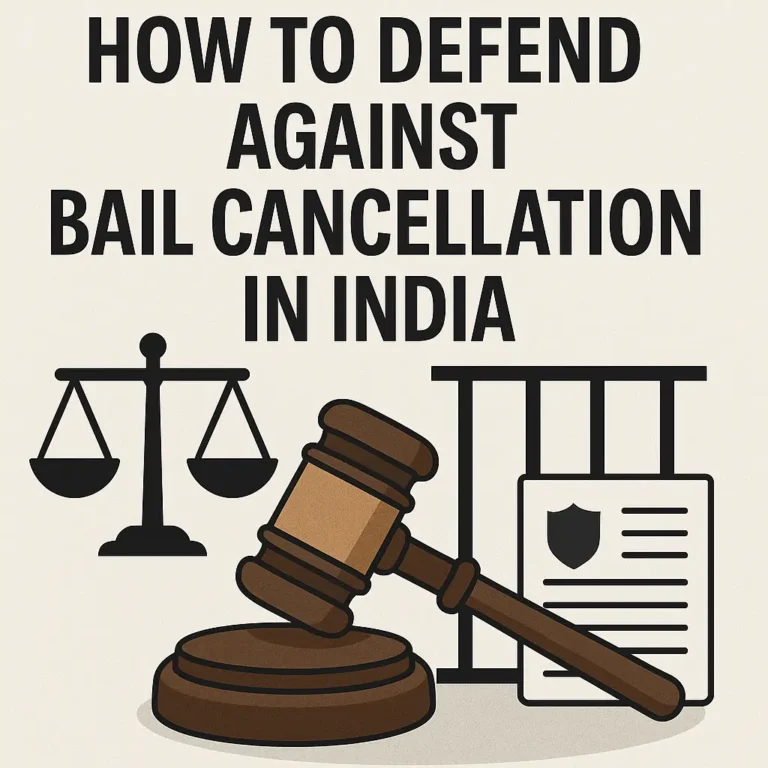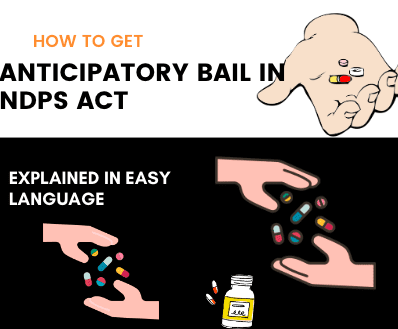Why This Article Matters for You
Whether you are an accused, a victim, or a legal professional, choosing the right kind of bail—and moving fast—often decides liberty, negotiation leverage, and even trial outcomes. Mis-timed or mis-framed applications are the single biggest reason bail gets denied in Indian courts.
Recent Supreme Court pronouncements—Union of India v. Man Singh Verma (2025) and Munnesh v. State of U.P. (2025)—have tightened the lens on judicial discipline while granting bail
Anticipatory Bail vs Regular Bail: Which One Do You Need?
When facing criminal charges in India, the type of bail you apply for can significantly impact your legal protection. But do you need anticipatory bail or regular bail? Understanding the difference is crucial for making the right move at the right time…
1. What Is Bail Under Indian Law?
Bail is the judicial release of a suspect or under-trial on prescribed conditions, pending investigation or trial. Constitutionally, it operationalises the right to personal liberty under Article 21.
2. Anticipatory Bail Explained
2.1 Legislative History
Introduced in 1974, § 438 CrPC aimed to protect citizens from arbitrary arrest. Under BNSS (in force 01-Jul-2024) it survives as § 482.
2.2 When Should You Seek It?
- You reasonably apprehend arrest on a cognisable offence.
- FIR may or may not be filed; even a threat of arrest triggers locus.
2.3 Courts’ Checklist
- Nature of accusation – grave or trumped-up?
- Antecedents – prior convictions weigh against you.
- Possibility of absconding – passport, local ties.
- Victim/witness intimidation risk.
These factors were reiterated by the Supreme Court in Sibbia (1980) and affirmed in Munnesh (2025).
2.4 Drafting Tips
- Attach pre-arrest investigation cooperation proof (emails, call logs).
- Suggest geo-tagged location sharing instead of custodial interrogation.
- Use colour-coded exhibits (e.g., Annexure-A, B, C) for quick bench reading—an advocacy hack that often sways a busy bail roster.
3. Regular Bail Demystified
Regular bail—§ 439 CrPC / § 483 BNSS—is curative. You apply after arrest.
3.1 The Triple Test
Courts look at:
- Flight risk
- Evidence tampering
- Repeat-offence probability
Violation of these tests explains 80 % of bail denials in trial courts.
3.2 Recent Judicial Red Lines
The Supreme Court, in Union of India v. Man Singh Verma (2025), slammed High Courts for over-stepping by granting compensation while deciding bail, underscoring that § 439 power is limited to grant/refusal.
4. Anticipatory vs Regular Bail—8 Key Differences
- Timing – pre-arrest vs post-arrest.
- Burden of Proof – anticipatory bail demands a reasonable apprehension; regular bail demands dismantling the triple test.
- Jurisdiction – anticipatory bail cannot be moved in Magistrate Court; regular bail can start there.
- Cancellation Power – far easier for prosecution to cancel anticipatory bail upon new incriminating material.
- Investigative Leverage – anticipatory bail forces police to rely on documentary summons; regular bail may allow custodial interrogation.
- Public Perception – obtaining anticipatory bail can blunt media narratives of “absconding accused.”
- Statutory Bars – certain statutes (e.g., NDPS § 37) create higher thresholds for regular bail but not for anticipatory bail (though practical hurdles remain).
- Conditions Imposed – anticipatory bail often carries stringent reporting and passport seizure upfront.
5. How Courts Decide: A Step-by-Step Workflow
5.1 For Anticipatory Bail
- Draft Application: Include certified copies of FIR (if available), threat material, prior orders.
- Move Sessions Court: Under § 482 BNSS first (High Court option if rejected).
- Hearing & Interim Protection: Seek short interim relief on first listing; High Courts increasingly grant “limited interim bail” since Sanjay Chandra line of cases.
- Final Order & Conditions.
5.2 For Regular Bail
- Remand Stage: Magistrate hears initial bail (§ 437).
- Sessions/High Court: If serious offences or bail denied below.
- Supreme Court: Via SLP if bail refused; guided by Munnesh SOPs.
6. Common Mistakes & How to Avoid Them
| Mistake | Fix |
|---|---|
| Filing anticipatory bail after arrest | Switch to regular bail instantly; don’t withdraw application mid-hearing. |
| Generic grounds (“I am innocent”) | Cite specific procedural defects—e.g., § 41A notice not served. |
| Ignoring victim’s viewpoint | Pre-emptively address victim concerns; attach undertakings. |
| Overloading application with case-law | Limit to 3-4 binding precedents that match facts. |
| Delay in applying | Police remand within 24 h can change entire bail calculus. |
7. Action Plan—Which Bail Do You Need?
Prepare Sureties: Identity proofs, financial capacity certificates, and local ties.
Assess Timing: If arrest is looming—anticipatory. If already behind bars—regular.
Collect Evidence: Screenshots, notices, CCTV, phone location logs.
Choose the Right Forum: Sessions vs High Court based on offence gravity.
Hire Specialist Counsel: Courts scrutinise quality of pleadings; templates won’t cut it.
8. Conclusion
Picking between anticipatory and regular bail isn’t just procedural trivia—it’s a strategic decision that can make or break the defence narrative. Map your facts to the correct provision (§ 482 or § 483 BNSS), anticipate prosecutorial objections, and file a laser-focused application backed by recent case-law. Liberty—and sometimes the entire outcome of the case—depends on it.
FAQs: Anticipatory Bail vs Regular Bail
Q.1 What is anticipatory bail under Section 482 BNSS (previously 438 CrPC)?
Anticipatory bail is a legal protection sought before arrest, available to someone who anticipates being falsely accused of a non-bailable offence.
Q.2 What is regular bail under Section 483 BNSS (previously 439 CrPC)?
Regular bail is relief from custody after arrest, granted under conditions by a court with appropriate jurisdiction.
Q.3 Can I apply for anticipatory bail even if an FIR is not yet filed?
Yes. If there’s a reasonable apprehension of arrest based on complaint or threats, anticipatory bail can be sought.
Q.4 Is anticipatory bail available for all offences?
No. It applies only to non-bailable, cognisable offences.
Q.5 Which court should I approach for anticipatory bail?
Sessions Court or High Court where the offence is alleged to have occurred.
Q.6 Does regular bail apply only after arrest?
Yes. You can apply for regular bail only once arrested or after voluntary surrender.
Q.7 What is the difference in procedure between anticipatory and regular bail?
Anticipatory bail is preventive (before arrest); regular bail is curative (after arrest).
Q.8 Can anticipatory bail be granted indefinitely?
Yes, unless time-limited by the court, anticipatory bail lasts through the trial.
Q.9 What are the key conditions attached to anticipatory bail?
No tampering with evidence, no witness contact, attendance at police station, and sometimes passport deposit.
Q.10 Can anticipatory bail be cancelled?
Yes. If conditions are violated or new evidence emerges, the court can cancel it.
Q.11 Is surety required for anticipatory bail?
Most courts mandate a solvent surety and personal bond.
Q.12 What is interim anticipatory bail?
Temporary protection from arrest until the final anticipatory bail hearing.
Q.13 Is anticipatory bail easier to get for women or senior citizens?
Yes. Courts often consider age, gender, and vulnerability while granting bail.
Q.14 What is the triple test for regular bail?
The court considers: (1) flight risk, (2) risk of tampering, and (3) chance of re-offending.
Q.15 Does anticipatory bail cover future complaints or FIRs?
No. It is case-specific and doesn’t protect against future FIRs.
Q.16 Can anticipatory bail be sought in economic offences?
Yes, unless barred by a special statute (like PMLA, SFIO, etc.).
Q.17 Is anticipatory bail granted in NDPS cases?
Difficult, due to Section 37 NDPS Act. Applicant must prove prima facie innocence and low risk of re-offending.
Q.18 Does a 41A notice from police negate the need for anticipatory bail?
No. While it reduces risk of arrest, you can still seek bail as a safeguard.
Q.19 Can I apply for regular bail in High Court directly?
Yes, especially if denied by Sessions Court or in serious offences.
Q.20 Do I need a lawyer for bail?
Not legally required, but professional help is strongly recommended.
Q.21 Can anticipatory bail be filed jointly by multiple accused?
Yes. Courts may hear joint petitions, but decide based on individual roles.
Q.22 Can police arrest me after anticipatory bail is granted?
No. You’re protected unless bail is cancelled.
Q.23 Can anticipatory bail be granted after charge sheet is filed?
Yes, provided the accused wasn’t arrested earlier.
Q.24 Can the court impose travel restrictions under anticipatory bail?
Yes. Conditions may include surrendering passport or travel ban.
Q.25 What is the success rate of anticipatory bail in India?
Generally 40–60%, depending on case facts, state, and offence type.
Q.26 Can anticipatory bail be rejected?
Yes. Especially in serious or heinous crimes, or if the accused has a criminal record.
Q.27 Can a person on anticipatory bail later apply for regular bail?
Yes, if they’re arrested or their anticipatory bail is revoked.
Q.28 Are personal appearances required for anticipatory bail hearings?
Yes, unless the court exempts the applicant.
Q.29 Can anticipatory bail be sought if the accused is abroad?
Yes, but the person must show intent to return and cooperate.
Q.30 Does anticipatory bail apply in cybercrime cases?
Yes, for non-bailable cyber offences.
Q.31 Can anticipatory bail be combined with an FIR quashing petition?
Yes, commonly done in High Courts for relief from arrest and to end proceedings.
Q.32 Will a prior bail rejection affect my reapplication?
Yes. You must show new facts or changed circumstances.
Q.33 What if I violate bail conditions?
The court may cancel the bail and issue a non-bailable warrant.
Q.34 Can anticipatory bail be granted in rape or POCSO cases?
Rarely. Courts usually prefer custodial interrogation in such cases.
Q.35 Is anticipatory bail possible in matrimonial disputes?
Yes. Common in 498A IPC and related complaints to prevent misuse.
Q.36 How long does it take to get bail?
It may take 1–14 days, depending on the case and court calendar.
Q.37 Do I need to be present for regular bail hearing?
Yes, personal appearance is usually required unless exemption is granted.
Q.38 Can anticipatory bail be modified later?
Yes. Courts can alter conditions on application showing sufficient cause.
Q.39 Is anticipatory bail available during police investigation?
Yes. It is typically filed during the initial stages of investigation.
Q.40 Is anticipatory bail allowed in cases involving public servants?
Yes, unless legally barred based on the nature of duty or statute.
Q.41 Can anticipatory bail be obtained during weekends or holidays?
Yes. Emergency benches or duty magistrates can hear urgent bail matters.
Q.42 What happens if anticipatory bail is denied?
You may file for regular bail after arrest or appeal to a higher court.
Q.43 Will getting anticipatory bail influence trial outcome?
No. Bail is not a reflection of guilt or innocence.
Q.44 Can anticipatory bail protect me from arrest in multiple FIRs?
No. You need separate bail for each FIR unless the court combines them.
Q.45 What is the cost of applying for bail?
Court fees are low (₹500–₹2000); lawyer fees vary by complexity and court.
Q.46 Can I use anticipatory bail order as defense if arrested?
Yes. Presenting the bail order prevents unlawful arrest.
Q.47 Will a clean criminal record help in bail?
Yes, especially for first-time offenders.
Q.48 Can I withdraw my anticipatory bail application?
Yes, before it is decided.
Q.49 Does bail protect me from police harassment?
Yes, it ensures you remain free and not taken into custody arbitrarily.
Q.50 What should I do if anticipatory bail is cancelled?
Immediately apply for regular bail or urgent relief from a higher court.















